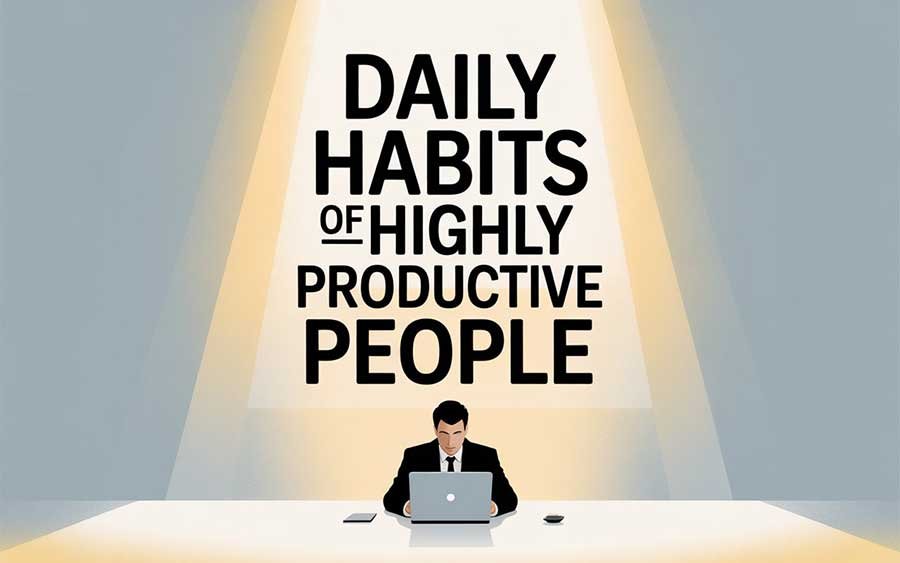
Unlocking Your Potential: The Daily Habits of Highly Productive People
In a world brimming with distractions, where the to-do list seems to grow faster than you can check things off, the concept of “productivity” often feels like an elusive superpower reserved for the elite. We look at those who seem to effortlessly juggle multiple responsibilities, achieve ambitious goals, and still maintain a semblance of work-life balance, and we wonder: How do they do it? Is it some inherent talent, a secret hack, or simply endless hours chained to a desk?

The truth is, high productivity isn’t a mystical gift; it’s a cultivated discipline. It’s built brick by brick, habit by habit, day after day. This isn’t just another article about getting more done; it’s your definitive, deep-dive guide into the daily habits of highly productive people. We’re talking actionable strategies, real-life transformations, and the kind of inspiration that will have you eager to craft your own path to peak performance.
Why Daily Habits Are the Cornerstone of High Productivity (and Your Personal Growth)
Before we dissect the specific habits, let’s understand why daily routines are so crucial, especially when striving for consistent productivity.
Imagine this: You wake up feeling energized, with a vague idea of what you need to accomplish. You check your phone, get sidetracked by emails, scroll through social media, and before you know it, half the morning is gone. The day feels reactive, not proactive, and your most important tasks are still untouched.
Daily habits, however, transform this chaotic scenario into a calm, controlled, and intentional process. They create a framework that supports your goals, reduces decision fatigue, and builds momentum. They’re the silent architects of success, allowing you to consistently show up, focus, and make meaningful progress towards what truly matters. Think of them as your personal operating system for optimal performance.
The Pillars of Peak Productivity: A Comprehensive Approach
Let’s break down the core components that underpin the success of highly productive individuals. Each pillar reinforces the others, creating a robust system that works for you.
Pillar 1: Strategic Planning & Prioritization – Before the Day Even Begins
This is step zero, and it’s often the most impactful. Highly productive people don’t stumble into their day; they design it.
- The Night Before Ritual: Dedicate 10-15 minutes at the end of each workday (or evening) to plan the next day. This involves identifying 1-3 “Most Important Tasks” (MITs) that must be completed, regardless of anything else.
- Time Blocking: Allocate specific, uninterrupted blocks of time for your MITs and other critical activities. Treat these blocks like non-negotiable appointments with yourself.
- The Power of “No”: Learn to politely decline requests or opportunities that don’t align with your priorities or current goals. Saying “yes” to everything means saying “no” to your own progress.
Why this matters: This proactive approach prevents overwhelm, ensures focus on high-impact activities, and reduces the likelihood of distractions derailing your day.
- Real-Life Example: Mark’s Evening Blueprint Mark, a freelance graphic designer, used to start his day feeling scattered. Client requests, administrative tasks, and creative work all vied for his attention. He implemented a “night before blueprint” routine. Every evening, he lists his MITs for the next day, estimates the time each will take, and blocks it out in his calendar. “It’s like laying out my clothes the night before,” Mark shares. “When I wake up, I know exactly what I’m wearing – or rather, what I’m doing. My mornings are calm, and I hit the ground running, rather than trying to figure out where to run.” This simple habit helped him increase his billable hours by 15% within a month.
Pillar 2: Intentional Morning Routines – Setting the Tone for Success
The way you start your day often dictates its trajectory. Productive people understand the power of a strong morning ritual.
- Wake Up Early (and Consistently): While the exact time varies, many productive individuals rise before the demands of the day begin, allowing for quiet reflection, planning, and personal development. Consistency is key, even on weekends.
- Hydrate & Nourish: Start with a glass of water, and follow up with a nutritious breakfast. Fueling your body properly sets the stage for sustained energy and focus.
- Move Your Body: Incorporate some form of physical activity, whether it’s a brisk walk, a quick workout, or stretching. Exercise boosts energy, clarity, and mood.
- Mindful Moments: Dedicate time for meditation, journaling, reading, or simply enjoying a cup of coffee in silence. This cultivates mental clarity and reduces stress.
- Avoid the “Scroll Trap”: Resist the urge to check emails or social media immediately upon waking. This often pulls you into a reactive state before you’ve even defined your proactive intentions.
Pillar 3: Focused Work Sprints & Strategic Breaks – The Rhythm of High Performance
Productivity isn’t about working longer; it’s about working smarter, with bursts of intense focus followed by strategic recovery.
- The Pomodoro Technique (or similar): Work in focused, timed intervals (e.g., 25 minutes) followed by short breaks (5 minutes). After several “pomodoros,” take a longer break. This prevents burnout and maintains concentration.
- Single-Tasking: While tempting to multitask, productive people know that true efficiency comes from dedicating full attention to one task at a time. Switch off notifications and close unnecessary tabs.
- Take Micro-Breaks: Step away from your screen, stretch, look out a window, or grab a drink. These short resets prevent mental fatigue.
- Deep Work Blocks: Schedule specific times for “deep work” – periods of uninterrupted, highly focused work on your most challenging tasks, free from distractions.
- Review & Adjust: Periodically check in with your plan throughout the day. Are you on track? Do you need to pivot due to unexpected circumstances?
- Real-Life Example: Emily’s Deep Work Sessions Emily, a software developer, struggled with context switching and feeling overwhelmed by constant interruptions. She started implementing “deep work” blocks for her coding. She’d put on noise-canceling headphones, turn off all notifications, and commit to 90 minutes of uninterrupted coding. “It was hard at first to resist checking Slack,” she admits, “but the difference in my output was incredible. I could complete tasks in half the time because I wasn’t constantly getting derailed. It felt like I finally had control over my own brain.” Emily credits this habit with a significant reduction in her stress levels and a higher quality of code.
Pillar 4: Continuous Learning & Reflection – Growth and Adaptation
Highly productive people aren’t stagnant; they are constantly evolving, learning from their experiences, and seeking improvement.
- Lifelong Learning: Dedicate time each day to learning, whether it’s reading industry articles, listening to podcasts, or taking an online course. Growth fuels new ideas and better solutions.
- Journaling & Reflection: Regularly reflect on your progress, challenges, and lessons learned. What worked today? What didn’t? How can you improve tomorrow?
- Seek Feedback: Don’t be afraid to ask for constructive criticism from peers, mentors, or supervisors. External perspectives can offer invaluable insights.
- Automate & Delegate: Identify repetitive tasks that can be automated (using technology) or delegated to others. Free up your time for higher-value work.
- Embrace Failure as Feedback: Productive people view setbacks not as failures, but as opportunities to learn, adapt, and improve their approach.
Pillar 5: Rest, Recovery, & Recharge – The Non-Negotiable for Sustained Performance
This is perhaps the most overlooked, yet vital, pillar. Sustainable productivity requires strategic downtime.
- Prioritize Sleep: Aim for 7-9 hours of quality sleep per night. Sleep deprivation severely impairs cognitive function, decision-making, and overall productivity.
- Evening Wind-Down Routine: Create a ritual that signals to your body and mind that it’s time to relax. This might include reading a physical book, taking a warm bath, or listening to calming music. Avoid screens before bed.
- Digital Detox: Implement periods where you disconnect from digital devices. This allows your mind to rest and reduces mental clutter.
- Hobbies & Interests: Engage in activities outside of work that you enjoy and that help you de-stress. These are not luxuries; they are essential for mental well-being and creative thinking.
- Nutrition and Hydration: Beyond breakfast, maintain consistent healthy eating habits and stay well-hydrated throughout the day. Your brain and body need proper fuel to function optimally.
Real-Life Transformations: How Daily Habits Changed Lives
The theory is great, but let’s see how these principles play out in the lives of real people.
- Sarah’s Entrepreneurial Ascension: Sarah, a solopreneur launching a new online business, was constantly overwhelmed and burning out. She implemented a strict morning routine: wake at 5 AM, meditate for 15 minutes, exercise for 30, and then spend an hour on her MITs before checking emails. “That hour of focused work before the world wakes up is my secret weapon,” Sarah declares. “I get my most important tasks done when my mind is fresh and there are no distractions. It’s the difference between feeling reactive and feeling in control.” Her business growth accelerated, and she found herself with more energy than ever before.
- John’s Corporate Comeback: John, a middle manager in a demanding corporate environment, felt like he was constantly putting out fires and never making strategic progress. He adopted time blocking and the Pomodoro technique. He also started dedicating 10 minutes at the end of each day to plan the next. “It sounds simple, but knowing exactly what I needed to focus on each day, and giving myself dedicated blocks for it, transformed my output,” John explains. “I stopped feeling guilty for taking breaks, knowing they were part of my ‘work system.’ My performance reviews improved, and I finally got that promotion I’d been aiming for.”
- The Rodriguez Family’s Harmonious Home: Maria and Carlos Rodriguez, juggling full-time jobs and three young children, felt like life was a constant race. They implemented family-wide “unplugged” evenings and made sleep a non-negotiable priority. They also started planning their family’s schedule and main tasks the night before. “We realized we were often sacrificing sleep and family time for perceived productivity,” Maria shares. “Now, we prioritize rest and intentional connection. We get less ‘stuff’ done in the evenings, but what we do accomplish is more meaningful, and we feel so much more connected as a family. Paradoxically, by prioritizing rest, we’re actually more effective during our work hours.” Their commitment to family values and well-being has led to a calmer, more joyful household.
These stories highlight a common thread: consistency, a willingness to experiment and adapt, and the understanding that sustained high productivity is an investment in your holistic well-being.
Picture This…
Imagine waking up feeling refreshed and energized, knowing exactly what your most important tasks are for the day. You move through your morning with intention, fueling your body and mind. Your work hours are characterized by focused bursts of effort, punctuated by restorative breaks. You end your day with a sense of accomplishment, not exhaustion, knowing you’ve made significant progress on your goals. You have time for loved ones, hobbies, and true rest. This isn’t a pipe dream; it’s the reality you can create by consistently adopting the daily habits of highly productive people.
20 Quotes to Inspire Your Productive Journey
- “The way we spend our time defines who we are.” – Unknown
- “Productivity is never an accident. It is always the result of a commitment to excellence, intelligent planning, and focused effort.” – Paul J. Meyer
- “The key is not to prioritize what’s on your schedule, but to schedule your priorities.” – Stephen Covey
- “Success is the sum of small efforts, repeated day in and day out.” – Robert Collier
- “It’s not about perfect. It’s about effort. And when you bring that effort every single day, that’s where transformation happens.” – Jillian Michaels
- “You don’t have to be great to start, but you have to start to be great.” – Zig Ziglar
- “Discipline is choosing between what you want now and what you want most.” – Abraham Lincoln
- “Motivation is what gets you started. Habit is what keeps you going.” – Jim Ryun
- “The miracle is not that we do this work, but that we are happy to do it.” – Mother Teresa
- “Your habits define your future.” – Unknown
- “Don’t wish it were easier, wish you were better.” – Jim Rohn
- “Action is the foundational key to all success.” – Pablo Picasso
- “The busiest people are often the most effective because they have to be.” – Unknown
- “We are what we repeatedly do. Excellence, then, is not an act, but a habit.” – Aristotle
- “Focus on being productive, not busy.” – Tim Ferriss
- “The best way to predict the future is to create it.” – Peter Drucker
- “Lost time is never found again.” – Benjamin Franklin
- “Energy is the currency of the high performer.” – Brendon Burchard
- “Take care of your body. It’s the only place you have to live.” – Jim Rohn (and essential for productivity!)
- “Start where you are. Use what you have. Do what you can.” – Arthur Ashe
Disclaimer
This article is intended for informational purposes only and is based on general knowledge, common practices, and observational studies of highly productive individuals. Individual results may vary, and what works for one person may not work for another. It is always recommended to adapt these principles to your unique circumstances, work style, and personal needs. This content should not be considered a substitute for professional advice in areas such as psychology, time management consulting, or healthcare.
Share This Article!
Did you find these insights valuable? Share this article with a friend, colleague, or on your professional networks! Let’s inspire more people to cultivate habits that lead to high productivity and fulfillment.






